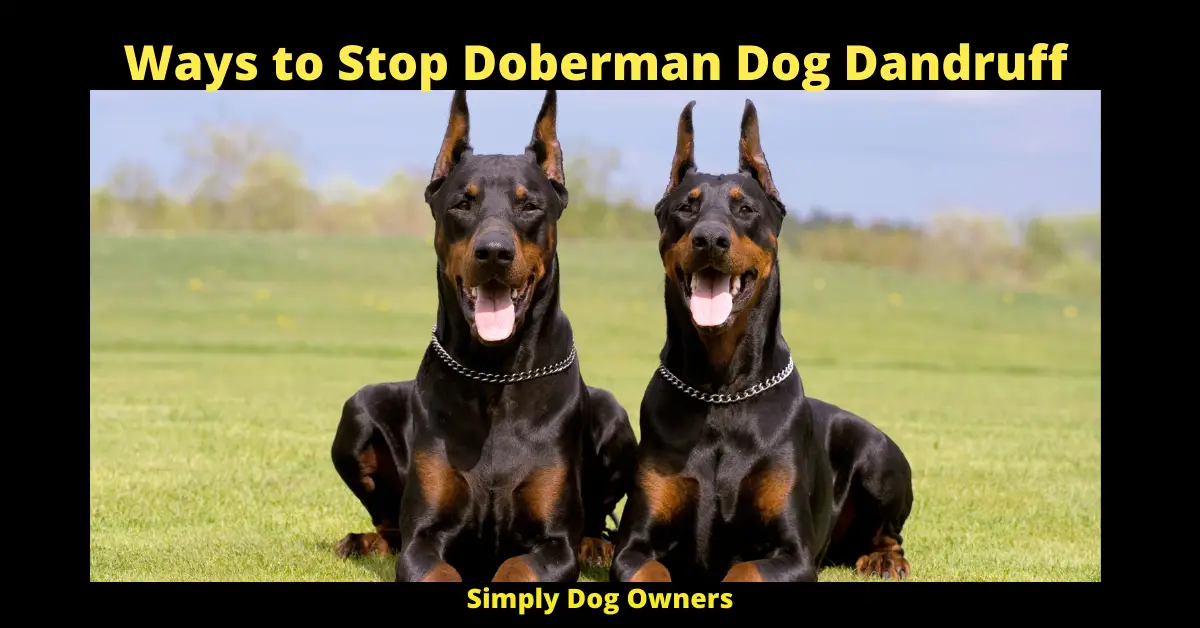As a General rule Doberman Dandruff can be caused by Allergies, Diet, Fungus, Pollen, Dander, Some of the most common ways to treat is by providing a better diet, regular baths with medicated shampoos, Regular brushing, adding skin enhancing supplements to the diet Omega – 3, Fatty Acids, and Vitamin E.
Doberman Dandruff
14 General Tips –
- Allergies
- Parasites
- Insect Bites
- Pollen
- Dander
- Fungus
- Change Diet
- Reduce Stress
- Regular Baths
- Regular Brushing
- Add Supplements
- Mites
- omega-3
- fatty acids
- vitamin E
Ways to Stop Doberman Pincher Dog Dandruff.
Ways to stop Doberman dog dandruff – You’re probably aware of a few humans who suffer from dandruff, but did you know dogs can develop dandruff as well? Perhaps you’ve noticed your pup scratching more frequently than usual or noticed white flakes on his bedding. Apart from irritated skin, these symptoms may indicate a skin condition called walking dandruff.
How do you know if your Doberman’s dandruff is severe enough to warrant a veterinarian visit? Because the symptoms of canine dandruff can be very similar to those of other skin conditions, it’s critical to understand what to look for and what treatment options to consider.
Doberman Dandruff on a Doberman can be distressing—not it’s only unsightly, but it usually indicates that something is wrong with your Doberman’s skin. Indeed, dandruff can be caused by many different factors, including allergies, parasites, illness, or food sensitivities.
There are numerous causes, but it’s important to remember that dandruff should never be considered “normal.” Noting that your veterinarian is the best resource for determining the cause of dandruff.
Dandruff is also one of the most common allergic symptoms in Doberman. The dandruff in dogs can also be caused by a range of food intolerances, allergic reactions to insect saliva and bites, and environmental irritants such as pollen and dander. Atopic dermatitis, dandruff, is frequently accompanied by other symptoms such as skin inflammation and discoloration.
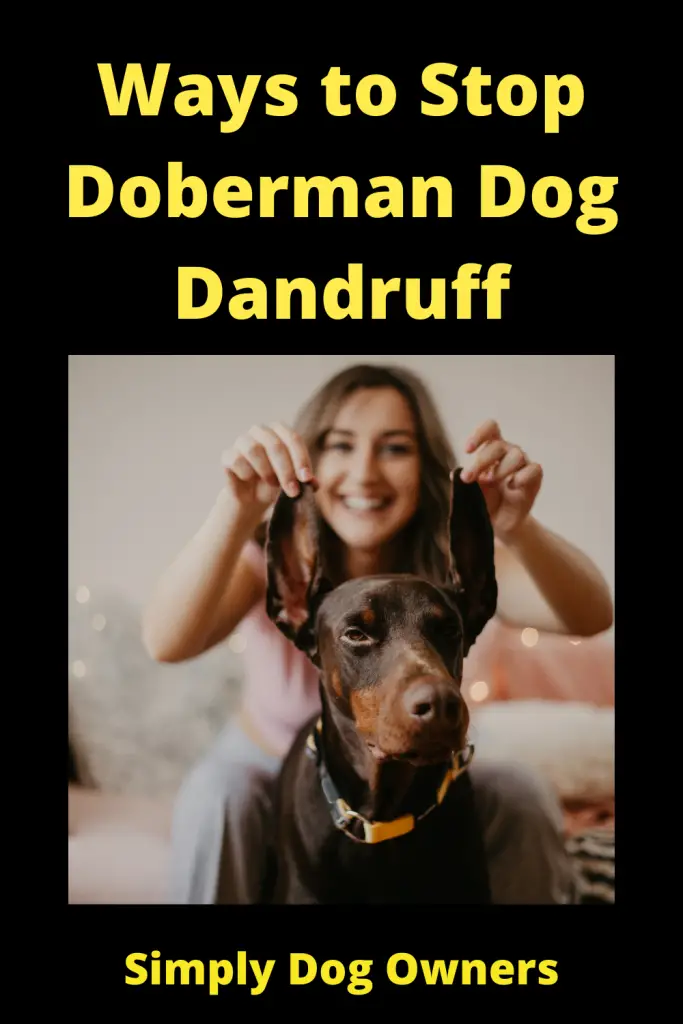
Consultation with your veterinarian can assist in narrowing down the most likely allergens and developing an appropriate plan of action.
While knowledge of your dog’s genetic history is critical for excluding hereditary causes, a comprehensive blood screen in conjunction with an allergy panel can help determine your dog’s level of intolerance to pests, foods, and environmental irritants.
Are you suspicious that your Doberman may have dandruff but are unsure? Typically, the concentration is concentrated in the lower back and around the base of the tail. Additionally, your pup’s coat can become oily if it has dandruff. The best treatment will depend on the specific cause of your pup’s dandruff, but these dog dandruff treatment ideas may help.
Regular Bathing and Grooming
Whether you groom your Doberman at home or prefer to hire a professional, grooming is an essential part of keeping a Doberman’s coat healthy and dandruff-free. Consult your veterinarian and groomer to determine if any unique treatments are available to help eliminate Doberman dandruff.
To combat dandruff, we like to use a mud bath. The mud baths contain exfoliants that remove dead skin cells and natural moisturizers that replenish the skin. For 10 to 15 minutes, the mud is massaged into the skin and coat.
Change Your Doberman’s Diet
Suppose your veterinarian suspects that your Doberman’s dandruff is caused by food allergies or sensitivities; changing his or her diet may help.
It is recommended that Doberman owners consult their veterinarians regarding the food they feed their dogs. Hypoallergenic diets, homemade foods (prepared under the supervision of a veterinary nutritionist), or commercially available diets for dogs with skin problems are all possible options.
Ease the Stress.
If your Doberman has recently been in a stressful situation, you may notice an increase in dandruff. Combating stress dandruff is difficult. No shampoo or diet modification will alleviate this. Only way to relieve this problem is to work with your Doberman. A dog trainer or behaviorist may be highly beneficial.
Brush Your Doberman’s Coat Regularly
Along with routine bathing and grooming, your Doberman should receive regular brushing. Brushing your Doberman’s coat can help keep it healthy. Simply brushing with a medium-firm brush regularly can help increase oil production and remove dead skin.
Because Dobermans have such a wide range of coat types, it isn’t easy to apply a single brushing schedule to all dogs. As a general rule, the thicker the coat, the more brushing. It is safe to say that all dogs would benefit from a weekly brushing.
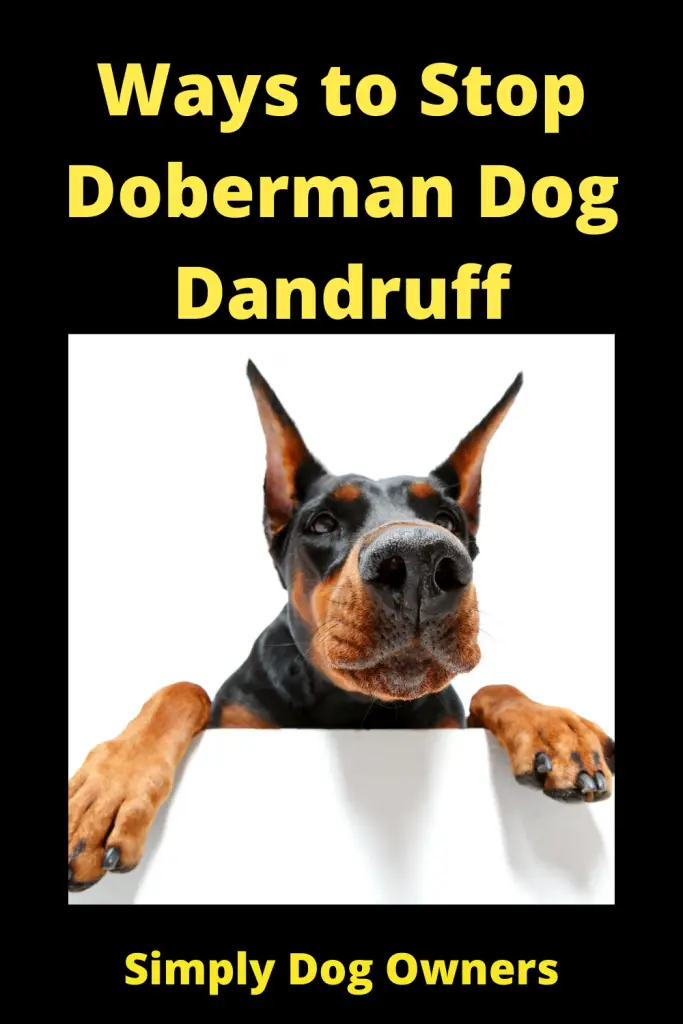
Consider Supplements
Supplementing your Doberman’s diet can be a relatively simple way to help with some common skin problems, as fatty acids can work to increase skin oil and reduce dandruff.
It is something that, depending on the circumstances, your veterinarian may recommend. Veterinarians frequently recommend that dogs take a dog-specific Omega-3 fatty acid supplement. Your veterinarian can make product recommendations based on your dog’s unique needs.
Don’t Overlook Other Issues
While dandruff is unsightly, the goal is not to remove it; instead, you want to determine the cause and treat your dog’s overall health. Regular veterinarian visits and visits when you suspect something is wrong are critical components of pet health.
The Facts About Doberman Dandruff
The dandruff is the buildup of dead skin cells on the coat of your Doberman. While it may be difficult to see the flakes depending on the color of your dog’s fur, they are frequently visible when they hop off the couch or place their head in your lap.
There are numerous ways for a dog’s skin to become irritated. From excessive licking to a nutritional deficiency, determining the root cause of dandruff can be challenging at times.
The first thing to contemplate is whether you notice dandruff throughout your pup’s coat or just in one area. Irritated skin in a single concentrated area may be a reaction to something your Doberman came into contact with, or it may be a sign of a more severe problem, such as an infection or parasite.
Consider seeking assistance from your veterinarian if you notice dandruff. Suppose you see any additional symptoms such as itching, reddened skin irritation, or scaly patches of hair loss. In that case, the best way of action is to contact your veterinarian immediately for assistance.
Because skin problems can be caused by genetic, environmental, nutritional, or parasitic factors, multiple treatment options may need to be explored.
What Causes Dog Dandruff / Science
A more severe condition known as walking dandruff could be the cause of your dog’s flaky, itchy skin. Dandruff is a parasitic infection caused by mites called cheyletiellosis. If your dog is scratching, licking, or maybe biting its skin, check for hair loss, redness, or scaly patches in the area.
Dandruff on the walk is highly contagious. Mites can easily spread to other household pets such as cats and rabbits, and in approximately 20% of cases, they can also infect humans. It is best to take your dog to the veterinarian immediately if you notice dandruff in conjunction with redness or scaling.
Unfortunately, there is no one-size-fits-all solution for walking dandruff. Your veterinarian will almost certainly prescribe a topical treatment called a dip that coats your dog’s fur in a mite-killing medication.
Dips and additional treatments may need to be repeated weekly for a period of up to six weeks. It would help if you also take any other household pets to the veterinarian for mite treatment, and you may need to treat your home with a mite and flea pesticide.
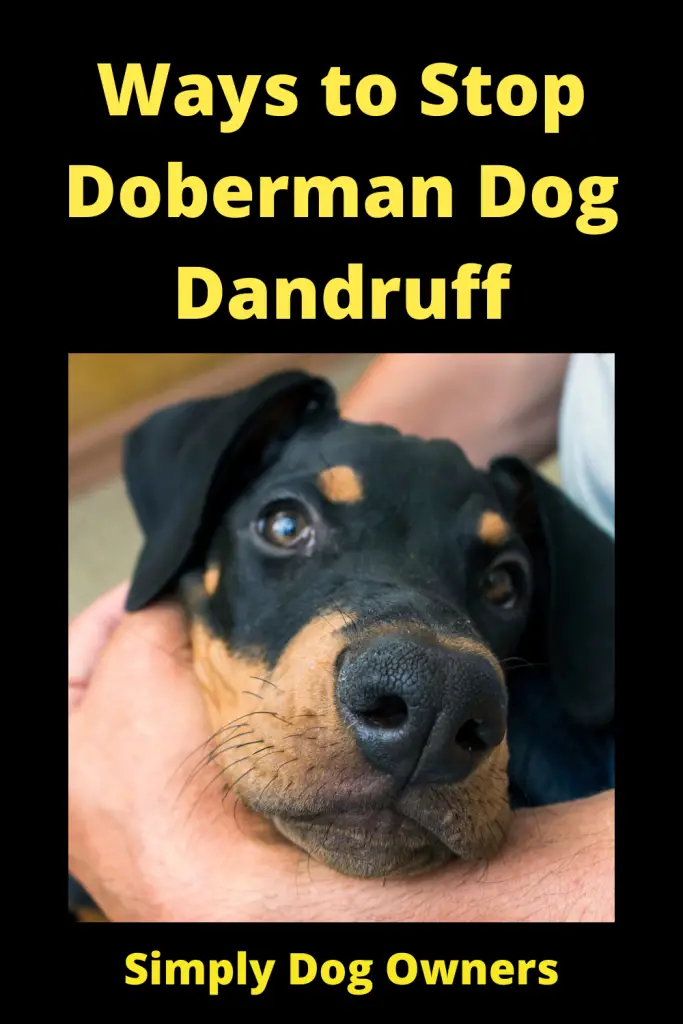
Nobody enjoys an itchy, uneasy puppy. Once their dandruff or other skin problems are resolved, you and your dog can spend more time doing the activities you both enjoy, itch-free.
Natural Treatments to prevent Dog Dandruff
There are a few preventative measures you can take to keep your dog’s dandruff and other skin problems at bay. It is recommended that pet owners begin grooming their dogs regularly.
Eliminating matted hair reduces parasite breeding grounds, and regular brushing encourages you to spend a few minutes checking your dog’s skin and coat for any problems. Additionally, you should check for seeds, burrs, and any other sharp plants or objects they may have picked up on their walk.
Your veterinarian may recommend bathing your dog more frequently to avoid dandruff. It is advised to use a specially formulated dog dandruff shampoo and thoroughly dry your pet after bathing.
If simple preventative measures such as grooming and bathing do not effectively eliminate dandruff in your dog, consult your veterinarian about unique food options or allergy testing. They can assist you in locating a dog food that contains omega-3 fatty acids and vitamin E to support a dog’s coat and immune system.
How often should I bathe my Doberman?
With his alert ears and regal stature, the Doberman pinscher is both a fierce protector and a devoted family dog. Despite his intimidating appearance, grooming him is relatively simple, although bath time may require an extra pair of hands.
Frequency
Scrubbing your gentle beast down removes dead hair, doggie odor, and any dirt accumulated in his coat. His size can make it more difficult, but fortunately, you won’t have to worry about this chore very often. He should require a bath approximately every three months if he is kept neatly brushed and has not rolled in anything particularly stinky or filthy.
Considerations
It is critical to keep your Dobie comfortable during bath time, as a comfortable Dobie is a more cooperative Dobie. Assure that the water is a comfortable temperature for him, and insert cotton balls into his ears to prevent water from trickling in.
Rinse thoroughly with gentle dog shampoo to remove dirt but leave the necessary moisturizing oils in his coat. Wash your dog’s face with a washcloth and water, paying particular attention to the area around his eyes. Dry him thoroughly with a towel, then duck and cover as he shakes himself dry.
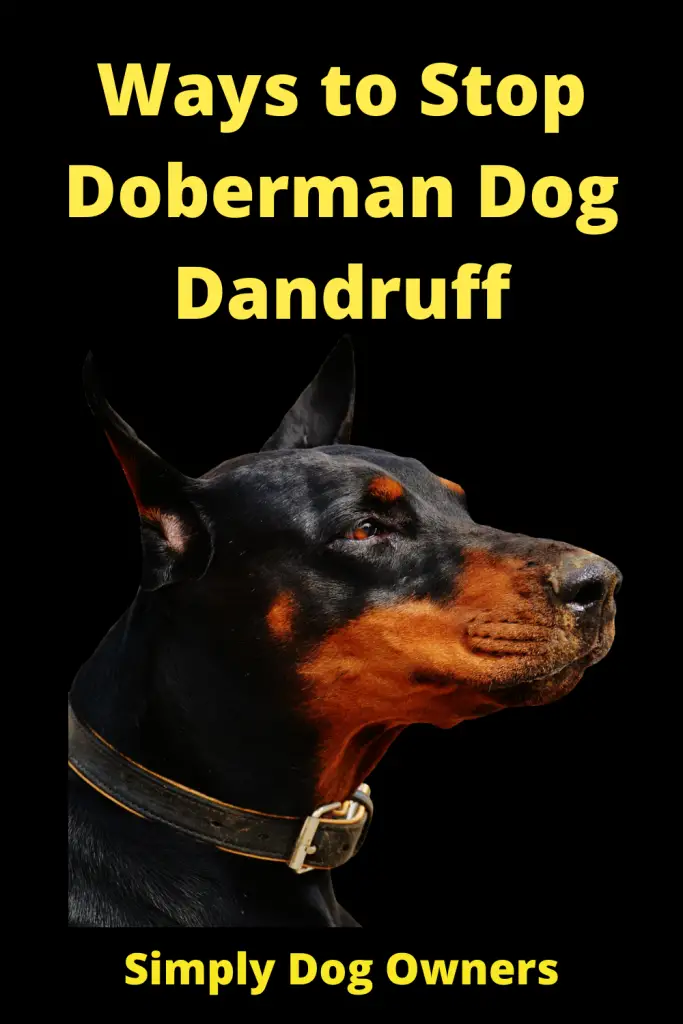
Shedding
Although Dobies have short coats that require only weekly brushing, they shed and leave their dark hair all over you and your home. They do not “blow” their coats like many other breeds, which means they do not lose large clumps of hair twice a year. Instead, they lose hair continuously throughout the year.
Brush your Dobie with a grooming mitt at least once a week to remove any loose hair and prevent mats and tangles. Regular brushing also aids in distributing the oils in his coat, which keeps it sleek and shiny.
Other Grooming Necessities
To keep your Dobie happy and healthy, he requires regular grooming attention to areas other than his coat. Once a week, inspect his ears for any unusual redness or odor indicating infection or ear mites. After you’ve examined them, clean them with a cotton ball and ear cleaner. Also, brush his teeth at least two to three times a week to keep his chompers in good shape.
Trim his nails at once a month by a professional groomer, as there is a sensitive vein inside that can easily be nicked by inexperienced hands. You do not want to injure your Dobie or encourage future uncooperative behavior, so delegate this task to a professional.
Doberman Dry Skin Treatments
While dogs are lovely to have around, they do occasionally become ill. It does not always have to be a severe illness but rather an annoyance. That is true of dry skin. Your four-legged companion may contract it, which can drive your pet insane. You do not have to sit and watch but can take action. Here are a few methods for treating your Doberman’s dry skin.
A little dose of vitamin E
Vitamin E oil does not have to be taken internally; it can be applied directly to the affected skin area. A little massage and perhaps a soak in a bathtub with vitamin E oil added to the water can quickly restore that skin’s health. If you choose to give vitamin E to your pet internally, exercise caution. Different breeds of dogs require different vitamin dosages. A veterinarian can advise you on the appropriate dosage.
Try some olive oil
Doctors advise humans to include a small amount of olive oil in their diet. It also has some fantastic benefits for dogs. All that is required is about a tablespoon of olive oil every week.
After a few days, the flaky skin should disappear, leaving your dog with a gleaming coat. Omega – 3 fatty acids are also beneficial in the fight against dry skin. As with vitamin E, consult your veterinarian to determine the appropriate amount to include in your Doberman’s food.
Grooming is essential
Minor details may contribute to the problem, and little information can be quickly corrected. Dirt and oil buildup in your Doberman’s coat can contribute to some of the skin issues you’re concerned about. Grooming entails brushing the coat meticulously regularly. This will ensure that the natural oils found on the Doberman’s body are distributed evenly.
This means that there is no oil buildup in one area, resulting in the development of skin problems. Matting is a condition that can directly result in dry skin. Grooming ensures that matting is removed and that the skin is better able to receive the necessary air.
Keep an eye out for the weather
This is true for your pet both inside and outside. Low humidity can exacerbate dry skin. When the weather turns cold this winter, it’s a good idea to confine the Doberman to the house as much as possible. However, the indoor climate can be just as dry. That is why investing in a humidifier will assist your pet in avoiding dry skin problems.
Bathing the right way
Everyone wants a clean pooch, but moderation is key. Establish a routine and, once established, evaluate the shampoo. The shampoo should not be yours.
While dogs may have thick coats, their skin is much thinner than yours. The pH level that is too high or too low can cause severe skin problems in your animal. The right type of post-bath conditioning spray can assist in softening and moisturizing your dog’s skin.
All of the above are necessary home remedies for your dog’s dry skin. Additionally, the dog could be having an allergic reaction to something.
Arranging for a visit to the veterinarian will assist in developing a strategy for treating dry skin. The great news is that we are not discussing major surgery or therapy. In most cases, using one or two of the above suggestions will suffice to remove the dry skin from your dog.
By the way, the fact that your pet has dry skin does not automatically imply that you are a bad dog parent. This is a relatively common situation in dogs, and it is not life-threatening. It is simply a source of discomfort for the animal and must be corrected.
The right food supplements or increased attention to grooming and bathing will quickly restore your dog’s healthy skin. The treatments may result in a beautiful coat for your sweet little companion. That is a pleasant side effect of treating dry skin.
Medical Treatment to Prevent Dog Dandruff
Following a diagnosis, it is critical to supplement medication with a healthy diet and grooming regimen. Though atopic dermatitis never completely resolves, bathing your dog regularly in cold water and using anti-itch shampoos can help alleviate discomfort.
To avoid further irritation, it is critical to bathe and groom your dog with only vet-grade products. Additionally, your veterinarian may prescribe corticosteroids and daily antihistamines to help your pet cope with environmental irritants.
Hypo sensitization therapy may also be recommended in more chronic cases, such as hypersensitivity or atopy. Small doses of hassles are directly injected into the bloodstream to stimulate antibody production and build resistance to allergies. Ask your vet for the safest course of action, as treatment is entirely dependent on the severity of allergic reactions and your dog’s response to medication.
Numerous veterinarians have begun prescribing homeopathic regimens to treat allergies. While homeopathy takes significantly longer to take effect than allopathy, it is a considerably less invasive course of treatment beneficial in the long run.
While medical intervention is required to address the underlying causes of dandruff, proactive health monitoring is critical to your dog’s well-being. While topical ointments can significantly alleviate dry skin and irritation, nothing can replace regular grooming and a healthy diet. To stimulate hair follicles, it is critical to groom with a firm brush and apply sufficient pressure. Regular grooming promotes not only a healthy coat but also a sense of well-being.
Along with regular grooming, a well-managed diet ensures that your canine’s nutritional requirements are met and that excessive weight gain is avoided. Not only does canine obesity cause dandruff, but it also results in a slew of other, more serious, and frequently fatal medical complications.
Pre-prepared pet food already meets your pet’s dietary requirements, though individual needs may require additional supplements. Including omega-rich meats such as fish in your daily diet or supplementing with salmon oil can go a long way to confirm a healthy coat and skin.
Additional measures to prevent Dandruff in Doberman.
Additionally, additional measures can be taken to alleviate irritation and itchiness associated with the onset of seasonal allergies. Some special oils and sprays help seal in moisture, medicated sprays that help relieve itching, and anti-dandruff dog shampoos that can help alleviate the symptoms of Atopic dermatitis.
Massages with coconut oil before bathing can help prevent dry skin caused by frequent bathing, and a healthy fat-rich diet can help improve the quality of fur. Finally, severe itching and irritation caused by dermatitis may result in a condition known as Lick Granuloma, in which constant licking results in wounds that penetrate several layers of skin.
Contrary to popular belief, rather than healing wounds, canine saliva harbors many bacteria that infect small pockets within these wounds. Small lesions develop into large, infested patches.
The patient has then prescribed antibiotics, anti-inflammatory medications, and topical antibacterial creams. In severe cases, additional surgical intervention may be required to remove infected tissue. While an Elizabethan collar or cast may temporarily allow a Granuloma to heal, the canine may resume licking when released. Constant irritation results in compulsive licking. Thus, vigilant monitoring of your dog is critical to avoid further discomfort.
Final Thoughts – Doberman Dandruff
Doberman owners should consider having their dog examined if they notice any unusual symptoms or changes, such as dandruff, increased thirst, or increased sleeping time. Our dogs cannot communicate what has occurred, and relying on our veterinarians to assist us in bridging the communication gap is always a critical component of providing the best life possible for your Doberman.
